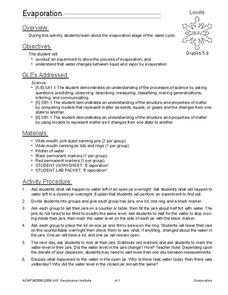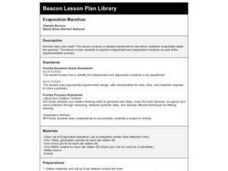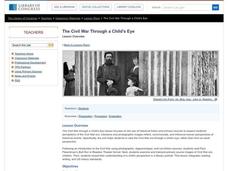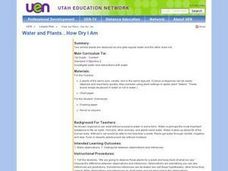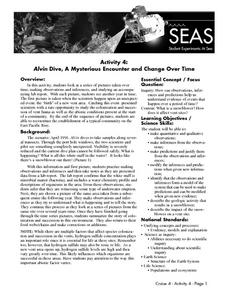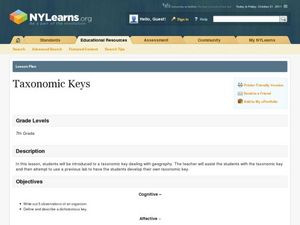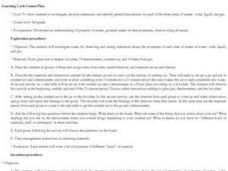Curated OER
Evaporation
Young scholars study the evaporation stage of the water cycle. In this water cycle activity, students participate in an experiment to study the process of evaporation that uses jars and water. Young scholars complete an observation...
Curated OER
Permafrost: Permanently Frozen Ground
Students explore permafrost. In this 3 states of matter lesson, students identify characteristics of solids and liquids. Students observe water and soil melting and freezing at various temperatures. Students make...
Curated OER
Water, Water Everywhere
Students explore water. In this water cycle lesson, students conduct a scientific investigation that requires build a terrarium models of the earth. Students record their observations of the changes regarding water in the terrarium.
Curated OER
Organizing Data Using Tables and Graphs
Students create graphs and tables, as well as interpret and make inferences from the data shown to determine when and where graphs and tables are most useful.
Curated OER
Evaporation Marathon
Young scholars review the steps of the scientific method and participate in a three day experiment. They observe water evaporation over time.
Curated OER
Leo and the Butterflies
Second graders read a book entitled, "Leo and the Butterflies." They discuss the rainforest and butterflies. Students observe the pictures and predict what will happen in the story. They examine reading strategies for decoding unfamiliar...
Curated OER
The Role of a Plantation Mistress
Students investigate the role of a plantation mistress. In this American history lesson, students examine the household accounts kept by Thomas Jefferson's wife. Students decide what Martha Wayles Jefferson's...
Curated OER
The Civil War Through a Child's Eye
Students use primary and secondary sources to observe a child's view of the Civil war. In this Civil War lesson, students understand that different people had different perspectives on the war. Students recognize the...
Curated OER
Rudyard Kipling's "Rikki-Tikki-Tavi": Mixing Fact and Fiction
"Rikki-Tikki-Tavi," from The Jungle Book, offers young readers a chance to examine how Rudyard Kipling uses setting and personification to bring to life the brave mongoose who battles cobras to protect his family. Class members...
Curated OER
Hero Or Zero?
Students investigate science and technology by reading a children's book. In this reading comprehension lesson, students read the story Archibald Frisby and discuss the ways we use science and technology in everyday life....
Curated OER
Whose Clues?
Students investigate interrelationships between animals and their environment by observing clues to wildlife activities, and inferring about the types of wildlife present in an area and their activities.
Curated OER
What Can We Learn From the Past?
Students observe items from their past, making inferences and observations about their own culture based on these artifacts. Students then share with the class what they learned about their own culture, giving all students more...
Curated OER
Water and Plants...How Dry I Am
First graders observe two similar plants as one gets water and the other does not. They make predictions and chart the growth of each. They draw pictures of the plants after one week.
Curated OER
Activity 4: Alvin Dive, A Mysterious Encounter and Change Over Time
Students receive copies of the Time Series Observations to use for note-taking. They work in small groups to discuss what they see when the outside lights of Alvin are turned on, and off, where the bacteria may have come from. They view...
Curated OER
Learning from Artifacts Uncovering Clues, Large and Small
Young scholars observe artifacts from Fort St. Louis at a website in order to make inferences about the people who lived there. They paint pottery in the style which might have been used by one of the cultural groups who inhabited the fort.
Curated OER
Taxonomic Keys
Seventh graders create their own dichotomous key. In this biology lesson, 7th graders classify animals based on their observable features. They explain how to use their dichotomous key.
Curated OER
How does the Amount of Light Affect a Photogram?
Students observe pictures of themselves using film and discuss how they think the image is processed to produce a photograph. They are introduced to photogram paper comparing it to photograph paper but understanding that no film is...
Curated OER
Bell Live! The Great Lakes: A Superior Adventure
Students participate in a virtual field trip to Lake Superior. In groups, they perform experiments in which test the level of toxins and bacteria in the water. They also watch video segments life in the lake and discuss their observations.
Curated OER
Learning Cycle Lesson Plan
students investigate, develop inferences, and identify general descriptions for each of the three states of matter - solid, liquid, and gas. students investigate water, by observing and stating inferences about, the properties of each...
Curated OER
Acid Precipitation
Students test the acidity of unknown solutions. They use this information to make inferences from data given from recorded rainfall records to identify areas that receive the most acid rain.
Curated OER
It's All In The Rocks
Students think critically to determine fact or inference when examining sedimentary layers with embedded fossils. Geology and evolutionary biology are introduced. They individually write a story about various diagrams and share their...
Curated OER
Color Dots 3
Students make simple observations, test mixtures, and make generalized inferences from their observations. They observe bleeding of colored inks with water.
Curated OER
Pulse
Students determine a baseline pulse rate then chart the changes in rate with exercise. They describe the changes and develop a rationale for their observations. The task assesses students' abilities to make simple observations, determine...
Curated OER
Inquiry Lesson About Color
Students investigate the color choices artists make in their work, and to practice the scientific process of predicting, observing, inferring, and interpreting. This lesson's purpose is to prepare students for a museum visit.
Other popular searches
- Inference and Observation
- Observation Inference Lab
- Observation Inference Demo
- Inference Observation
- Observation Inference Science


